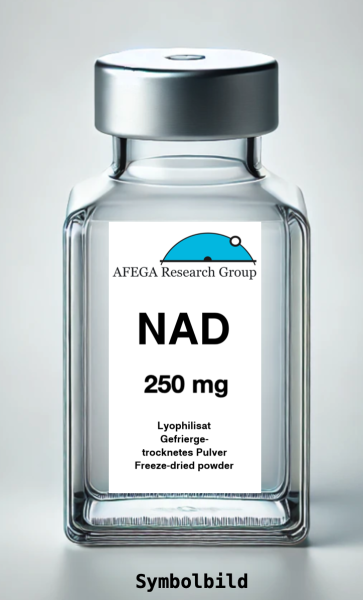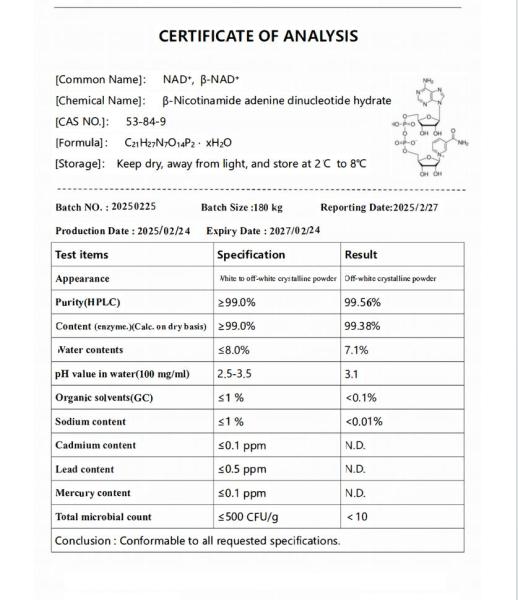1 injection bottle of dry substance in a 10 ml ampoule (dry substance/lyophilisate): This is a vial containing a freeze-dried powder (lyophilisate). It must be reconstituted (i.e., dissolved) with a solvent (e.g., sterile water) before use.
Guarantee: Pharmaceutical quality! - The producer is ISO 9001 and GMP certified. - The quality of the product is regularly monitored by the AFEGA Research Group!
Best before: 1 year when stored in a cool (2-8°C), dry place, and away from light!
For outside temperatures above 18°C, refrigerated shipping is recommended! (Click the link and add to your order!)
*** Delivery to addresses outside the EU ***
If the delivery address is outside the EU, you bear the risk in case of import issues in your country. Therefore, do not order without making sure that you are permitted to import these infusions! For deliveries outside the EU, we only ship via express due to the need for refrigeration. Please select the appropriate shipping option during checkout!
Please note: Infusions are excluded from the right of return due to the special delivery requirements!
Advantages of lyophilized (freeze-dried) NAD+ powder over other forms
Stability and Shelf Life
Lyophilized NAD+ powder is particularly stable and has a long shelf life thanks to the freeze-drying process. The removal of water protects the sensitive molecule from degradation through hydrolysis or microbial contamination, which is a common problem with liquid solutions. This allows NAD+ in powder form to be stored for extended periods without significant loss of active ingredients.
Purity and Dosing Accuracy
This lyophilized NAD+ is offered in pharmaceutical or laboratory-grade quality. The powder can be precisely dosed and used flexibly for various applications (e.g., infusions, injections, cell culture). Compared to tablets or capsules, which often contain fillers and excipients, the powder offers a higher concentration of active ingredients and fewer impurities.
Flexibility of Use
The powder can be reconstituted as needed, for example, with sterile saline for infusions or other suitable solvents for research purposes. This allows for customized adjustment of the concentration and application form, which is not possible with pre-prepared solutions or solid dosage forms.
Transport and Storage
Lyophilized powder is lighter and requires less space to transport than liquid preparations. It does not require a continuous cold chain as long as it is stored in a dry, light-protected place, simplifying logistics and reducing costs.
Less Risk of Chemical Degradation
In its dry state, NAD+ is significantly less susceptible to oxidation and other chemical degradation processes than in solution, ensuring quality until use.
Sources:
[1] https://ch.iherb.com/blog/nad-nmn-aging-benefits/1640
[2] https://www.zentrum-der-gesundheit.de/ernaehrung/nahrungsergaenzung/weitere-nahrungsergaenzungsmittel/nad
[3] https://www.orthoknowledge.eu/artikel/nad-und-alterung
[4] https://www.krebsinformationsdienst.de/fachkreise/nachrichten/detail/nahrungsergaenzungsmittel-nadh-gegen-krebs
[5] https://www.gesundheits-lexikon.com/Anti-Aging-Medizin/Schluesselgene-und-Signalwege-in-der-Anti-Aging-Forschung/NAD-und-sein-Einfluss-auf-das-Altern
[6] https://www.klartext-nahrungsergaenzung.de/faq/projekt-klartext-nem/nad-und-nmn-in-nahrungsergaenzungsmitteln-38606
[7] https://www.ganzimmun.de/fileadmin/user_upload/NAD_LIN0062_001.pdf
******
NAD+ (nicotinamide adenine dinucleotide) is an essential coenzyme found in every cell of the body and plays a central role in energy metabolism and cellular repair mechanisms. With increasing age, NAD+ levels in the body decrease, which has been linked to a variety of age-related health problems. NAD+ infusions, in which NAD+ is administered directly into the bloodstream, have gained popularity in recent years. The following review examines the current state of scientific research on the benefits and risks of this form of therapy.
Potential Benefits of NAD+ Infusions
1. Supports Cellular Metabolism and Energy Production
NAD+ is a key factor in energy metabolism, particularly in the function of mitochondria, the "powerhouses" of cells. Studies show that increasing NAD+ levels can improve mitochondrial function and promote cellular health. (Verdin et al., Cell Metabolism, 2015)
2. Improves DNA Repair and Cellular Stress Response
NAD+ activates sirtuins and PARPs (poly-ADP-ribose polymerases), enzymes involved in DNA repair and the regulation of cellular stress. Higher NAD+ levels may therefore help mitigate cellular damage caused by aging and environmental factors. (Imai & Guarente, Nature Reviews Molecular Cell Biology, 2014)
3. Promoting Neurological Health
NAD+ is associated with neuronal function and the repair of neurological damage. Preliminary studies suggest that NAD+ infusions may be beneficial for neurodegenerative diseases such as Parkinson's and Alzheimer's. (Braidy et al., Frontiers in Aging Neuroscience, 2019)
4. Supporting Addiction
Some clinical reports suggest that NAD+ infusions may help alleviate withdrawal symptoms and stabilize brain chemistry in people with alcohol or drug addiction. (Ross et al., Journal of Substance Use, 2018)
5. Anti-Aging Effects
Reducing NAD+ levels has been linked to aging and chronic diseases. Animal studies show that increasing NAD+ levels can promote longevity. (Yoshino et al., Cell Metabolism, 2018)
Risks and Side Effects of NAD+ Infusions
1. Inadequate Long-Term Studies
Although NAD+ infusions have shown positive results in pilot studies, comprehensive long-term studies on safety and efficacy in humans are currently lacking.
2. Acute Side Effects
Symptoms such as nausea, headache, hot flashes, and dizziness have been reported in some patients during or after NAD+ infusions. These side effects appear to be dose-dependent. (Bogan & Brenner, Annual Review of Nutrition, 2008)
3. Potential Effects on Metabolism
Increased NAD+ levels may theoretically affect the balance of other metabolic pathways. This could be particularly problematic in people with metabolic disorders such as diabetes or certain cancers.
4. Cost and Accessibility
NAD+ infusions are expensive and not currently covered by standardized clinical guidelines. They could therefore be considered more of an experimental therapy.
5. Infusion-Related Risks
As with any intravenous therapy, there is a small risk of infection, thrombosis, or allergic reactions.
Conclusion
NAD+ infusions offer promising potential to support cellular health, particularly in age-related diseases and certain neurological and metabolic disorders. However, their use remains experimental.
Sources:
[1] https://www.medrxiv.org/content/10.1101/2024.06.06.24308565v1.full
[2] https://vitalivtherapy.com.au/studies-on-the-benefits-of-nad/
[3] https://biorestorehealth.com/newtown-connecticut/what-is-nad-iv-therapy-process-benefits-and-risks/
[4] https://aestha.co.uk/nad-iv-drip/
[5] https://pmc.ncbi.nlm.nih.gov/articles/PMC9512238/
[6] https://www.azivmedics.com/side-effects-of-nad-therapy
[7] https://www.impnaples.com/post/the-science-behind-nad-iv-therapy-benefits-risks-and-effectiveness
Why are infusions so expensive?
Members of our research group use our NAD powder to prepare infusions for their personal use. This isn't a problem for us, as we only need to trust ourselves regarding purity and, in particular, freedom from microbes. However, if you offer NAD infusions professionally, you have a special responsibility to your patients/customers and therefore require a particularly high level of safety. This high level of safety is legally enforced through (complex) documentation requirements on the part of the producers (in this case, a specially authorized pharmacy). These infusions are not so expensive because the substance used is purer or even more effective, but because the high purity can/should be GUARANTEED through complex documentation requirements (every batch must be fully traceable from the production/manufacturing of the NAD to the final product).



